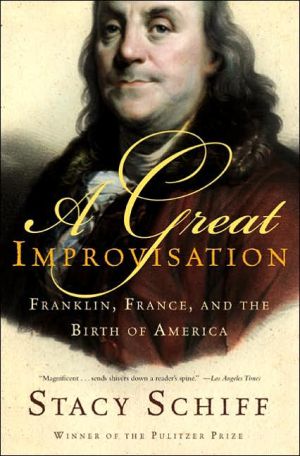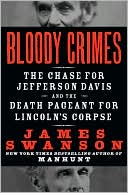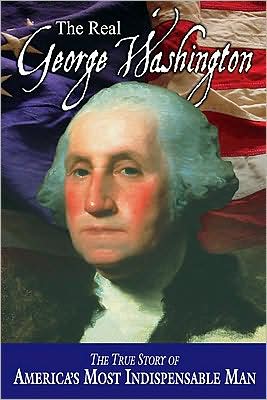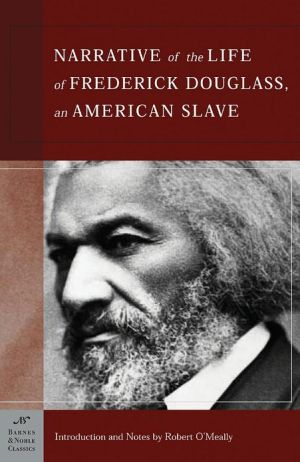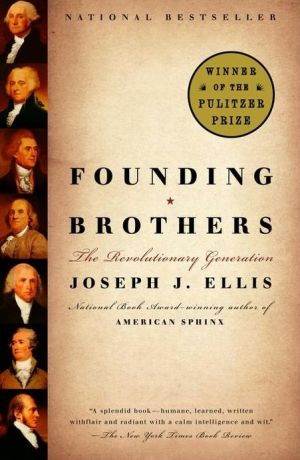A Great Improvisation: Franklin, France, and the Birth of America
In this dazzling work of history, a Pulitzer Prize-winning author follows Benjamin Franklin to France for the crowning achievement of his career\ In December of 1776 a small boat delivered an old man to France." So begins an enthralling narrative account of how Benjamin Franklin-seventy years old, without any diplomatic training, and possessed of the most rudimentary French-convinced France, an absolute monarchy, to underwrite America's experiment in democracy.\ When Franklin stepped onto...
Search in google:
“In December 1776, a small boat delivered an old man to France.” So begins a dazzling narrative account of Benjamin Franklin’s French mission, the most exacting–and momentous–eight years of his life. When Franklin embarked, the colonies were without money, munitions, gunpowder or common cause; like all adolescents, they were to discover that there was a difference between declaring independence and achieving it. To close that gap Franklin was dispatched to Paris, amid great secrecy, across a winter sea thick with enemy cruisers. He was seventy years old, without any diplomatic training, and possessed of the most rudimentary French. He was also among the most famous men in the world. Franklin well understood that he was off on the greatest gamble of his career. But despite minimal direction from Congress he was soon outwitting the British secret service and stirring passion for a republic in an absolute monarchy.In A Great Improvisation Pulitzer Prize winner Stacy Schiff offers an utterly fresh and thrilling account of Franklin’s Parisian adventure and of America’s debut on the world stage. Schiff weaves her tale of international intrigue from new and little-known primary sources, working from a host of diplomatic archives, family papers, and intelligence reports. From her pages emerges a particularly human Founding Father, as well as a vivid sense of how fragile, improvisational, and international was our country’s bid for independence. The New York Times - Walter Isaacson Franklin was an ideal choice for the mission, as Stacy Schiff shows in this meticulously researched and judicious account of his eight years as a diplomatic dazzler and charmer in Paris.
From A Great Improvisation:\ Typically after an ocean crossing Franklin's eyes brimmed with tears at the sight of land; he had just withstood the most brutal voyage of his life. For thirty days he had pitched about violently on the wintry Atlantic, in a cramped cabin and under unremittingly dark skies. He was left with barely the strength to stand, but was to cause a sensation. Even his enemies conceded that he touched down in France like a meteor. Among American arrivals, only Charles Lindbergh could be said to have met with equal rapture, the difference being that Lindbergh was not a celebrity until he landed in Paris. At the time he set foot on French soil Benjamin Franklin was among the most famous men in the world. It was his country that was the great unknown. America was six months old; Franklin seventy years her senior. And the fate of that infant republic was, to a significant extent, in his hands.
Cast of CharactersxiIntroduction1IThe First Mistake in Public Business Is the Going into It 17767IIHalf the Truth Is Often a Great Lie 1776-177736IIIThree Can Keep a Secret, If Two of Them Are Dead 177765IVThe Cat in Gloves Catches No Mice 1777-177894VThere Is No Such Thing as a Little Enemy 1778126VIAdmiration Is the Daughter of Ignorance 1778165VIISuccess Has Ruined Many a Man 1779196VIIIEveryone Has Wisdom Enough to Manage the Affairs of His Neighbors 1780229IXThe Sting of a Reproach Is the Truth of It 1780-1781260XThose Who in Quarrels Interpose May Get Bloody Nose 1782291XIThe Absent Are Never Without Fault 1783325XIICreditors Have Better Memories Than Debtors 1784-1785359Epilogue398Chronology413Notes419Selected Bibliography459Acknowledgments463Index467
\ From the Publisher"In sparkling prose, burnished to a high gloss, Stacy Schiff tells the tale of Benjamin Franklin in Paris with piquant humor, outrageous anecdotes worthy of the finest French farce, and a wealth of lapidary observations. Her Paris unfolds as a glittering carnival of spies, rogues, frauds, and flawed reformers, eccentric nobility and perpetually squabbling American diplomats. Towering above all is the protean figure of Franklin, an improbable compound of wit, cunning, hypocrisy, courage, and tireless devotion to his country. C'est magnifique!" — Ron Chernow, author of Alexander Hamilton\ "This is a book to savor. Every page has some new nugget of insight, or some graceful turn of phrase that generates a verbal airburst over the most psychologically agile American of his time, perhaps of all time. Schiff has given a genuine jolt to the recent surge of interest in Franklin, along the way demonstrating why she is generally regarded as one of the most gifted storytellers writing today."—Joseph J. Ellis, author of Founding Brothers and His Excellency: George Washington\ "What a brilliant book. A Great Improvisation pays tribute to the extraordinary love affair between monarchist France and the republican Benjamin Franklin. Their child was America, conceived at home and nurtured into maturity by France. It is a story full of intrigue, jealousy and passion. But ultimately it is a celebration of one American's love for his country. Stacy Schiff has written a masterpiece, capturing a fleeting moment when the stars aligned between Congress and Versailles. "— Amanda Foreman, Author of Georgiana: Duchess of Devonshire\ "Stacy Schiff's extensive scholarship, her eye for the colorful detail, and her lively wit combine to bring alive — in full dress and in an absorbing narrative — the cast of statesmen, adventurers, spies, courtiers, patriots and con men who have a part in the story of Benjamin Franklin's negotiations for American independence, and to fix among them America's greatest diplomat, winning his way (and America's) in a style of calculated disarray. An extraordinary book." — Edmund S. Morgan, author of Benjamin Franklin\ "This remarkable book breaks new ground. Stacy Schiff has dug deep into the archives of France (no mean feat!) and brought up a motherlode of gems which, polished by her wit, illuminate the doublespeak of the ambassadorial world, as well as the ferocious backbiting among the colonial envoys. From this maelstrom emerges Franklin, inventing the American foreign service as he had figured out electricity, bifocals, a new stove, the glass armonica — step by cautious step." — Claude-Anne Lopez, Author of Mon Cher Papa: Franklin and the Ladies of Paris\ \ \ \ \ \ Walter IsaacsonFranklin was an ideal choice for the mission, as Stacy Schiff shows in this meticulously researched and judicious account of his eight years as a diplomatic dazzler and charmer in Paris.\ — The New York Times\ \ \ Isabelle de CourtivronDespite the undeniable impact on U.S.-French relations of two tumultuous centuries, A Great Improvisation reminds us that profound cultural differences between the two societies have not changed all that much -- and thus remain at the root of their conflicting visions of the world. Plus ça change . . \ — The Washington Post.\ \ \ \ \ Publishers WeeklyNumerous bestselling volumes have been written recently on the man one biography called "the first American." Pulitzer Prize-winner Schiff (for Vera [Mrs. Vladimir Nabokov]) eloquently adds to our understanding of Benjamin Franklin with a graceful, sly and smart look at his seven-year sojourn in France in his quasi-secret quest to secure American independence by procuring an alliance with the French. Drawing on newly available sources, Schiff brilliantly chronicles the international intrigues and the political backbiting that surrounded Franklin during his mission. "A master of the oblique approach, a dabbler in shades of gray," she writes, "Franklin was a natural diplomat, genial and ruthless." She deftly recreates the glittering and gossipy late 18th-century Paris in which Franklin moved, and she brings to life such enigmatic French leaders as Jacques-Donatien Chaumont, Franklin's closest adviser and chief supplier of American aid, and Charles Vergennes, the French minister of foreign affairs, who helped Franklin write the French-American Alliance of 1778. Franklin also negotiated the peace of 1783 that led not only to the independence of the colonies from Britain but also to a bond between France and America that, Schiff says, lasted until WWII. Schiff's sure-handed historical research and her majestic prose offer glimpses into a little-explored chapter of Franklin's life and American history. Agent, Lois Wallace. (Apr. 2) Forecast: This should receive excellent review coverage, which will boost sales, and perhaps the blurb from Joseph Ellis will help. Copyright 2005 Reed Business Information.\ \ \ \ \ Library JournalA Pulitzer Prize-winning biographer travels to Paris as Ben Franklin persuades the French to back the Colonies. Copyright 2004 Reed Business Information.\ \ \ \ \ Kirkus ReviewsHere's breaking news for the Francophobic freedom-fries set: without France, there would have been no United States. "The majority of the guns fired on the British at Saratoga were French," writes ace biographer/historian Schiff (Vera [Mrs. Vladimir Nabokov], 1999; Saint-Exupery, 1994). "Four years later, when the British set down their muskets at Yorktown, they surrendered to forces that were nearly equal parts French and American, all of them fed and clothed and paid by France, and protected by de Grasse's fleet." Moreover, she adds, the French came up with the equivalent of $9 billion to secure American independence. But without Benjamin Franklin, Schiff argues, France likely would not have come to the aid of the fledgling republic. It was not only that Franklin, who a few years before had been an ardent royalist, presented the American cause as an ideal way for France to play knavish tricks on Britain, but also that Franklin was not Silas Deane. The latter, a staid Connecticut businessman, was Congress's representative in Paris, having arrived there just three days after the Declaration of Independence was promulgated; his duties also involved espionage, but Deane was an unable spy. Moreover, he was a bumpkin compared to the British ambassador, who had a grand time announcing every American defeat to the court at Versailles. Franklin's reputation as a sophisticate and man of letters and science preceded him, and he found himself welcome and even lionized. His steady lobbying soon brought material aid to the much-suffering rebels, though the French and Americans forged a partnership "founded on various illusions about the past and a general misunderstanding of the future"; theprofessional French military scorned the American militia as mere rabble, and the French in general felt that the Americans showed too little gratitude to them for their help. Which evens the score, one supposes, for subsequent American complaints that the French have been insufficiently grateful for our help. . . . A lively, well-written, and most timely study of diplomacy in action. Author tour\ \
